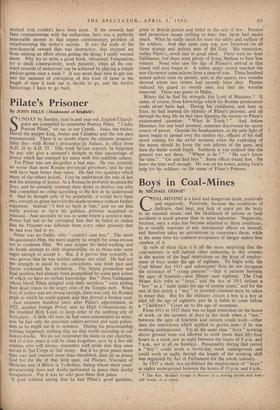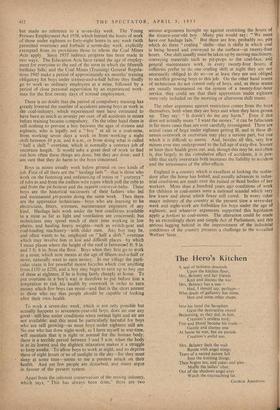Boys in Coal-Mines
By MICHAEL GEDGE* COAL-MINING is a hard and dangerous trade, positively and negatively. Positively, because the conditions of ' darkness, dust heat, and lack of space put the body to an unusual strain; and the likelihood of serious or fatal accidents is much greater than in most industries. Negatively, because, once a man has become adjusted to these conditions, he is usually unaware of any detrimental effects on himself. and therefore takes no precautions to counteract them; while at the same time his constant acceptance of danger makes him careless of it.
In view of these facts it is all the more surprising that the coal-industry is still behind other industries in this country in the matter of the legal restrictions on the hour of employ- ment of boys under the age of eighteen. To begin with, the Coal Mines Act 1911 and subsequent Acts do not recognise the existence of " young persons "—that is persons between the ages of fourteen—now fifteen—and eighteen. The Coal Mines Acts refer to " boys," and the Act of 1911 defines a " boy " as a " male under the age of sixteen years," and for the rest of this article a " boy " in inverted commas must be taken to mean that. But for the ordinary citizen a boy is a boy at least till the age of eighteen, and he is liable to come before a " Children's Court up to the age of seventeen.
From 1911 to 1937 there was no legal restriction on the hours of work, or the number of days' in the week when a " boy " between the ages of fourteen and' sixteen could work—other than the restrictions which applied to grown men—if he was working underground. Yet at the same time " boys " working above ground were not allowed to work more than fifty-four hours in a week, nor at night between the hours of 9 p.m. and 5 a.m., nor at all on Sundays. Presumably during that period a " boy" could work a seven-day week underground and could work at night, though the length of the working shift was regulated by Act of Parliament for the whole industry.
In 1937 a short Act .pfohibited the employment of "boys" " at nights underground between the hours of 10 p.m. and 6 a.m.,
• The Rev. Michael Gedge is Rector of a mining parish and him-. self works as .a miner.
but made no reference to a seven-day week. The Young Persons Employment Act 1938, which limited the hours of work of'those under eighteen to forty-eight hours in any week (with permitted overtime) and forbade a seven-day week, explicitly exempted from its provisions those to whom the Coal Mines Acts apply. Since 1937 indirect progress has been made in two ways. The Education Acts have raised the age of employ- ment for everyone to the end of the term in which the fifteenth birthday falls; and the Coal Mines (Training) General Regula- tions 1945 make a period of approximately six months' training obligatory for boys under sixteen-and-a-half before they finally go to work as ordinary employees at a mine, followed by a period of close personal supervision by an experienced work- man for the first twenty days of normal employment.
There is no doubt that the period of compulsory training has greatly lowered the number of accidents among boys at work in the coal-industry, which experienced men have estimated to' have been as much as seventy per cent. of all accidents in mines before training became compulsory. On the other hand there is still nothing to prevent a boy between the ages of sixteen and eighteen, who is legally not a " boy " at all in a coal-mine, from working seven days a week or from working a night shift between 10 p.m. and 6 a.m., or from doing what is called " half a shift " overtime, which is normally a contract job of uncertain length. It would take a great deal of work to find out how often these things are done. but they are done; and I am sure that they do harm to the boys concerned.
Boys in mines usually work below ground on two kinds of job. First of all there are the " haulage lads "—that is those who work on the fastening and unfastening of trains or " journeys " of tubs to and from the endless wire ropes which pull the tubs to and from the pit-bottom and the nearest conveyor-belts. These boys are the historical successors of their fathers who led and maintained pit-ponies doing the same work. Then there are the apprentice technicians—boys who are learning to be electricians, fitters, wiremen, maintenance engineers of any kind. Haulage lads work under the best conditions available in a mine as far as light and ventilation are concerned; but technicians may spend much of their time working in loW -places, and hauling heavy weights—such as switch-gear and coal-loading machinery—with older men. Any boy may be, and often wants to be, employed on " half a shift " overtime which may involve him in low and difficult places --by which I mean places where the height of the roof is between•2 ft. 9 in. and 3 ft. 6 in. from the floor. Boys when they first go to work in a mine, which now means at the age of fifteen-and-a-half or more, naturally want to earn money. In our village the parti- cular craze is for powerful motor bicycles which cost anything from £150 to £250, and a boy may begin to save up to buy one of these at eighteen, if he is living fairly cheaply at home. To put overtime in a boy's way is therefore to put before him a temptation to risk his health by overwork in order to earn money which few boys can resist—and that is the short answer to those who say that people should be capable of looking after their own, health.
To work a seven-day week, which is not only possible but actually happens to seventeen-year-old boys, does no one any good—still less under conditions when normal light and air are not available; and this must be particularly harmful for boys who are still growing—as most boys under eighteen still are. No one who has done night-work, as I have myself in war-time, will maintain that it is right or normal for the human body; there is a terrible period between 3 and 5 a.m. when the body is at its lowest and the slightest relaxation makes it a struggle to keep awake. To allow boys to work at night, and so deprive them of eight hourS or so of sunlight in the day—for they must sleep at some time—seems to me a positive attack on their health. And yet few people are disturbed, and many argue in favour of the present system.
Apart from the inherent conservatism of the mining industry, which says, " This has always been done," there are two serious arguments brought up against restricting the hours of the sixteen-year-old boy. Many pits would say: " We must have our haulage lads." But there are few, probably no, pits which do three " coaling " ∎shifts—that is shifts in which coal is being hewed and conveyed to the surface—in twenty-four hours. One shift usually must be taken up by moving machinery, conveying materials such as pit-props to the coal-face, and general maintenance work, in every twenty-four hours; if collieries prefer to do one coaling shift at night they are not necessarily obliged to do so—or at least they are not obliged to sacrifice growing boys to this job. On the other hand teams of technicians do not consist only of boys. and, as these teams are usually maintained on the system of a twenty-four-hour service, they could see that their apprentices under eighteen were 'only included on the morning or afternoon shift teams.
The other argument against restriction comes from the boys themselves, both when they are boys and when they have grown up. They say: " It doesn't do me any harm." Even if this does not actually mean " I want the money." it can be fallacious in far more cases than are ever carefully, investigated. There are actual cases of boys under eighteen getting ill, and in these ill- nesses overwork or overstrain may play a serious part, but one which it is difficult to assess. And, besides all this, very few miners ever stay underground to the full age of sixty-five. Sooner or later their health gives out, and, though this may be, and often is, due largely to the cumulative effect of accidents, it is pos- sible that early overstrain both increases the liability to accident and the serLousness of the after-effects.
England is a country which is excellent at locking the stable- door after the horse has bolted, and usually advances in indus- trial conditions are made over the ruined or 'dead bodies of her workers. More than a hundred years ago conditions of work for children in coal-mines were a. national scandal which very few knew and about which fewer still cared. In every other major industry of the country at the present time a seven-day week and night-work are forbidden for boys under the age of eighteen; and whatever arguments supported this legislation apply a fortiori to coal-mines. The alteration could be made by an exceedingly short and simple Act of Parliament, and this serious lagging behind in the improvement of, the industrial conditions of the country presents a challenge to the so-called Welfare State.



































 Previous page
Previous page